Virus and Spyware Removal Guides, uninstall instructions
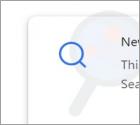
What kind of application is New key?
Upon examining the New key browser extension, it has been concluded that its purpose is to function as a browser hijacker. More precisely, this app is created to change the settings of hijacked browsers to force users to use keysearchs.com, a fake search engine. Applications of this nature should not be regarded as trustworthy.

What kind of malware is Keylock?
Keylock is a ransomware-type program discovered by our researchers during a routine inspection of new file submissions to the VirusTotal platform. Ransomware operates by encrypting files to demand payment for the decryption.
On our testing system, Keylock encrypted files and appended their filenames with a ".keylock" extension. To elaborate, a file originally named "1.jpg" appeared as "1.jpg.keylock", "2.png" as "2.png.keylock", and so forth for all of the affected files.
After the encryption process was completed, a ransom-demanding message titled "README-id-[username].txt" was created (filename varying based on the username; "README-id-KAROLISLIUC875C.txt" on our test machine). Keylock also changed the desktop wallpaper.
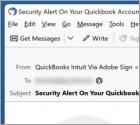
What is "Intuit QuickBooks Database Encryption Upgrade"?
After careful analysis, it has been established that this email intends to entice recipients to open the attached file and submit their personal information. This email is disguised as correspondence from Intuit, an American business software company. Such emails, often referred to as phishing emails, are a common form of online deception.
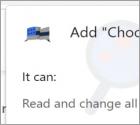
What kind of application is Choose All Languages?
The Choose All Languages application is marketed as a browser enhancement tool that facilitates text translation through a simple right-click anywhere in the browser. Nevertheless, a closer examination has unveiled that Choose All Languages presents intrusive advertisements. Such applications are categorized as adware.

What kind of malware is Hjutm?
Hjutm is ransomware belonging to the Xorist family. It has been discovered while examining samples uploaded to the VirusTotal page. Hjutm is designed to encrypt files, rename all encrypted files (append the ".hjutm" extension to filenames), display an error window, and create the "КАК РАСШИФРОВАТЬ ФАЙЛЫ.txt" file (both containing a ransom note).
Hjutm renames files in the following pattern: it changes "1.jpg" to "1.jpg.hjutm", "2.png" to "2.png.hjutm", and so on.
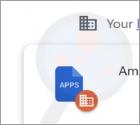
What kind of application is AmebelodonFricki?
AmebelodonFricki is a malicious browser extension capable of reading and changing certain data, managing other extensions, and controlling the Chrome browser in other ways. This app is distributed via a malicious installer we have discovered on a suspicious website. Thus, users should avoid adding this app to their browsers.
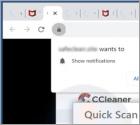
What is "CCleaner Total Protection" pop-up scam?
After a thorough analysis of the page, it became evident that it employs deceitful tactics to mislead visitors into thinking they need to take specific actions to eliminate the purportedly detected viruses. This website displays counterfeit messages and other content with the intention of deluding its users. These fraudulent schemes are commonly referred to as pop-up scams.
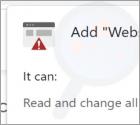
What kind of software is Website Errors Checker?
Our researchers discovered Website Errors Checker while reviewing questionable websites. This browser extension is promoted as a tool with access to a database of over 500 website errors, which includes relevant information such as how to resolve these issues.
After examining Website Errors Checker, we determined that it is adware. This browser extension runs intrusive advertisement campaigns and collects sensitive browsing data.
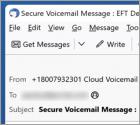
What kind of email is "Voicemail Message Received"?
After reviewing the "Voicemail Message Received" email, we determined that it is spam. This letter falsely claims that the recipient has been sent a voicemail relating to finances. The supposed message is in the attachment, which is actually a phishing file that targets email account log-in credentials.
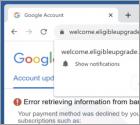
What kind of scam is "Error Retrieving Information From Bank"?
While investigating suspect websites, our research team discovered the "Error Retrieving Information From Bank" scam. It falsely claims that there is an issue with the user's preferred payment method. Despite how the scam is presented, it is in no way associated with Google LLC or any of its services and platforms.
More Articles...
Page 170 of 2139
<< Start < Prev 161 162 163 164 165 166 167 168 169 170 Next > End >>